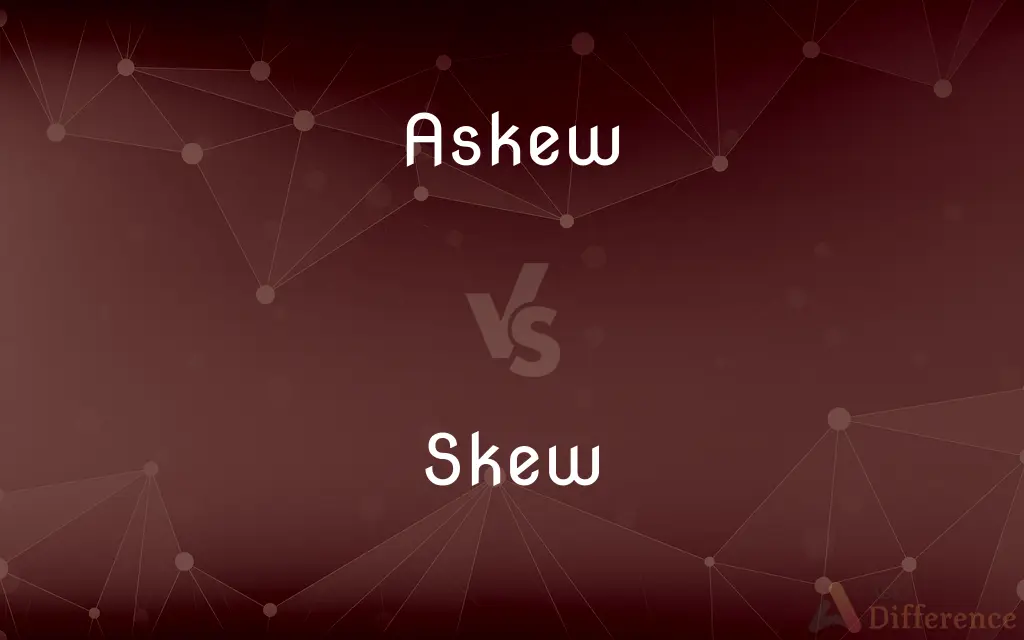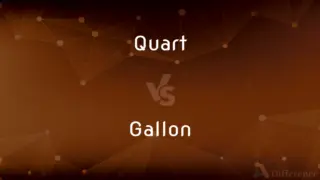Askew vs. Skew — What's the Difference?
By Tayyaba Rehman — Updated on September 24, 2023
"Askew" means not straight or out of line; "Skew" refers to a slant or angle, or can be a verb meaning to distort or misrepresent.

Difference Between Askew and Skew
Table of Contents
ADVERTISEMENT
Key Differences
Askew" is an adverb or adjective that carries with it the imagery of something not being straight, a slight deviation from the norm, often suggesting a sense of disorder or irregularity. For instance, a hat worn at a tilt or a painting not hung straight might be described as askew. On the contrary, "Skew" is more versatile in its usage. It can be a noun referring to an angle or slant, or a verb meaning to distort or set at an angle.
The term "Askew" conjures up images of unintentional tilts or slants, often leading to an appearance that might seem off or misaligned. Think of it as an unintended departure from what's expected. "Skew", as a noun, holds mathematical and geometrical weight. It defines a particular angle or direction. As a verb, to skew means to alter or change, often in a manner that distorts the original meaning or appearance.
Consider data representation: data can be skewed, meaning it's not represented accurately, leading to potential misconceptions. On the other hand, "Askew" isn't commonly used in such contexts. It's more apt for describing visual or positional irregularities in everyday objects.
Essentially, while "Askew" predominantly paints a picture of visual misalignment, "Skew" dives deeper, exploring angles, directions, and even the concept of distortion in both tangible and abstract realms.
Comparison Chart
Part of Speech
Adjective/Adverb.
Noun/Verb.
ADVERTISEMENT
Meaning
Not straight or out of line.
A slant or angle; to distort.
Common Contexts
Visual irregularities, positioning.
Geometry, data representation, intentional distortion.
Tone
Often suggests unintentional misalignment.
Can suggest intentionality or a specific angle.
Usage
Descriptive for appearances.
Descriptive and functional for angles or distortions.
Compare with Definitions
Askew
Not in a straight or level position.
His tie was askew after the long meeting.
Skew
An oblique angle or slant.
The building had a unique skew in its architecture.
Askew
Crooked or tilted position.
She looked at him with an askew smile.
Skew
Not straight or aligned.
The data was skew, leading to incorrect conclusions.
Askew
Having a slanted or oblique direction.
Her hat sat askew, giving her a playful look.
Skew
To turn or place at an angle
Skew the cutting edge of a plane.
Askew
Deviating from the expected or straight line.
The books were stacked askew on the shelf.
Skew
To give a bias to; distort
The use of a limited sample skewed the findings of the study.
Askew
Askew is an English surname.
Skew
To take an oblique course or direction.
Askew
Not in a straight or level position
Her hat was slightly askew
Skew
To look obliquely or sideways.
Askew
To one side or out of proper alignment; awry
Rugs lying askew.
Skew
To display a statistical tendency toward
A television program that skews toward teenagers.
Askew
Turned or twisted to one side.
Skew
Placed or turned to one side; asymmetric.
Askew
(figuratively) Untoward, unfavourable.
Skew
Distorted or biased in meaning or effect.
Askew
Tilted to one side.
He wore his hat askew
Skew
Having a part that diverges, as in gearing.
Askew
Awry; askance; asquint; oblique or obliquely; - sometimes indicating scorn, or contempt, or entry.
Skew
(Mathematics) Neither parallel nor intersecting. Used of straight lines in space.
Askew
Turned or twisted toward one side;
A...youth with a gorgeous red necktie all awry
His wig was, as the British say, skew-whiff
Skew
(Statistics) Not symmetrical about the mean. Used of distributions.
Askew
Turned or twisted to one side;
Rugs lying askew
With his necktie twisted awry
Skew
An oblique or slanting movement, position, or direction.
Askew
Out of line or off to the side.
The picture hung askew on the wall.
Skew
(transitive) To form or shape in an oblique way; to cause to take an oblique position.
Skew
(statistics) To cause (a distribution) to be asymmetrical.
Skew
(transitive) To bias or distort in a particular direction.
A disproportionate number of female subjects in the study group skewed the results.
Skew
To hurl or throw.
Skew
(intransitive) To move obliquely; to move sideways, to sidle; to lie obliquely.
Skew
(intransitive) To jump back or sideways in fear or surprise; to shy, as a horse.
Skew
(intransitive) To look at obliquely; to squint; hence, to look slightingly or suspiciously.
Skew
(not comparable) Neither parallel nor perpendicular to a certain line; askew.
A skew arch
Skew
Of two lines in three-dimensional space: neither intersecting nor parallel.
Skew
Of a distribution: asymmetrical about its mean.
Skew
(rare) Askew, obliquely; awry.
Skew
Something that has an oblique or slanted position.
Skew
An oblique or sideways movement.
Skew
A squint or sidelong glance.
Skew
A kind of wooden vane or cowl in a chimney which revolves according to the direction of the wind and prevents smoking.
Skew
A piece of rock lying in a slanting position and tapering upwards which overhangs a working-place in a mine and is liable to fall.
Skew
A bias or distortion in a particular direction.
Skew
(electronics) A phenomenon in synchronous digital circuit systems (such as computers) in which the same sourced clock signal arrives at different components at different times.
Skew
(statistics) A state of asymmetry in a distribution; skewness.
Skew
(architecture) A stone at the foot of the slope of a gable, the offset of a buttress, etc., cut with a sloping surface and with a check to receive the coping stones and retain them in place; a skew-corbel.
Skew
The coping of a gable.
Skew
One of the stones placed over the end of a gable, or forming the coping of a gable.
Skew
Awry; obliquely; askew.
Skew
Turned or twisted to one side; situated obliquely; skewed; - chiefly used in technical phrases.
Skew
A stone at the foot of the slope of a gable, the offset of a buttress, or the like, cut with a sloping surface and with a check to receive the coping stones and retain them in place.
Skew
To walk obliquely; to go sidling; to lie or move obliquely.
Child, you must walk straight, without skewing.
Skew
To start aside; to shy, as a horse.
Skew
To look obliquely; to squint; hence, to look slightingly or suspiciously.
Skew
To shape or form in an oblique way; to cause to take an oblique position.
Skew
To throw or hurl obliquely.
Skew
Turn or place at an angle;
The lines on the sheet of paper are skewed
Skew
Having an oblique or slanting direction or position;
The picture was skew
Skew
To distort or misrepresent.
The results were skewed by the outliers.
Skew
To set or place at an angle.
He skewed the camera for an artistic shot.
Skew
Deviating from the norm or standard.
His views tend to skew from mainstream opinions.
Common Curiosities
Can "Skew" refer to a specific angle?
Yes, "Skew" can denote a particular oblique angle or direction.
Is "Askew" always unintentional?
Typically, "Askew" suggests unintentional misalignment, but context matters.
Can objects be both askew and skew?
An object can be placed askew (tilted) and have a skew (angle) in its design.
Is "Askew" formal in usage?
It's standard and can be used in both formal and casual contexts.
Can data be described as askew?
Data is typically described as "skewed." "Askew" is less common in that context.
Are "Askew" and "Skew" interchangeable?
Not always. They have different connotations and specific uses.
Can "Askew" describe a mood?
Metaphorically, yes, like "His mood was askew."
Is "Skew" always about distortion?
No, it can also simply denote an angle or direction.
Which word has broader applications?
"Skew" has broader applications, from angles to data distortions.
Can a view be askew?
In terms of sightline, yes. But for opinions, "skew" is more appropriate.
Is a skewed opinion biased?
Yes, a skewed opinion suggests a distortion from what's neutral.
Share Your Discovery

Previous Comparison
Quart vs. Gallon
Next Comparison
Sanction vs. CondoneAuthor Spotlight
Written by
Tayyaba RehmanTayyaba Rehman is a distinguished writer, currently serving as a primary contributor to askdifference.com. As a researcher in semantics and etymology, Tayyaba's passion for the complexity of languages and their distinctions has found a perfect home on the platform. Tayyaba delves into the intricacies of language, distinguishing between commonly confused words and phrases, thereby providing clarity for readers worldwide.















































